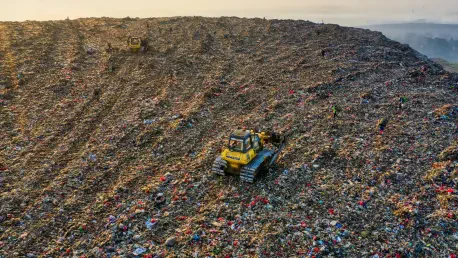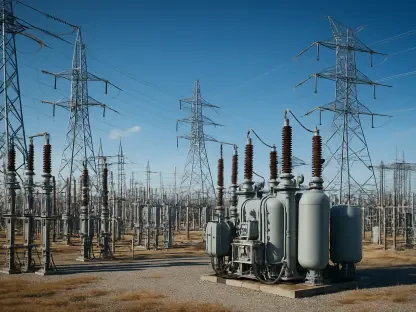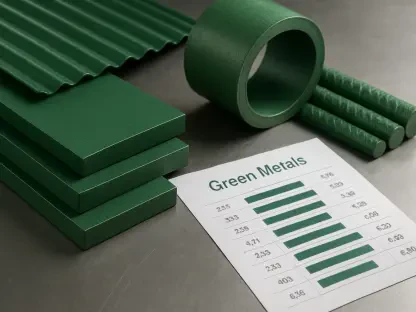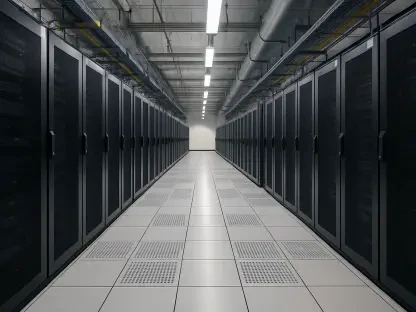How much trash can a nation hold before the ground beneath it groans under the weight? In the United States, where millions of tons of waste are generated each year, landfill capacity is becoming a critical concern, and companies like Republic Services and Win Waste are at the forefront of this battle, recently securing approvals to expand their facilities in Oregon and Ohio. These victories, while essential for managing society’s refuse, ignite fierce debates over environmental risks and community well-being. This feature delves into the gritty reality of landfill expansions, exploring the stakes, the struggles, and the solutions shaping the future of waste management.
The Urgency Behind Expanding Landfills
Landfills remain a cornerstone of America’s waste disposal system, processing an estimated 146 million tons of municipal solid waste annually, according to the Environmental Protection Agency. With urban populations swelling and consumption patterns intensifying, the pressure on existing sites has reached a breaking point. For operators like Republic Services and Win Waste, expansions are not merely growth strategies but necessities to prevent overflowing dumps and illegal disposal practices that could further harm the environment.
This need, however, collides with a rising tide of public scrutiny. Communities near proposed expansion sites often fear the consequences—polluted water sources, toxic air emissions, and relentless odors that disrupt daily life. The tension between accommodating society’s waste and safeguarding local ecosystems has turned landfill projects into battlegrounds, where every decision reverberates through regulatory halls and neighborhood streets alike.
Spotlight on Oregon: Republic Services’ Hard-Fought Win
In Benton County, Oregon, Republic Services manages the Coffin Butte Landfill, a sprawling 178-acre site that handles 1.1 million tons of waste each year. After years of pushback, the company recently gained approval to expand by an additional 59 acres. The victory came after a contentious process, with the county’s Planning Commission initially rejecting the proposal due to concerns over traffic congestion and environmental degradation.
The Benton County Board of Commissioners eventually approved the expansion, but not without attaching nearly three dozen stringent conditions. These include enhanced litter control measures and funding for continuous environmental monitoring. Despite this compromise, opposition persists, with appeals to state-level bodies like the Oregon Land Use Board of Appeals still possible, signaling that the fight is far from over.
A local resident, speaking at a public hearing, captured the frustration felt by many: “Living near a landfill means constant worry about what’s in the air and water. No amount of rules can fully ease that burden.” This sentiment underscores the deep-rooted distrust that often colors these projects, even when safeguards are promised.
Ohio’s Battleground: Win Waste Faces Regulatory Hurdles
Across the country in Ohio, Win Waste has been navigating its own rocky path to expand the Fostoria landfill by 94 acres. Local resistance, backed by the Seneca County General Health District, resulted in a slew of strict permit conditions targeting odor control and erosion prevention. Community members voiced fears of declining property values and health risks, painting a vivid picture of life near an expanding dump.
Win Waste challenged these conditions as overly restrictive, finding partial relief from the Ohio Environmental Review Appeals Commission, which struck down several local mandates. The Ohio EPA ultimately approved the expansion, bolstered by the company’s $54 million investment in gas treatment systems to curb odors. A company representative stated, “These investments show our commitment to minimizing impact while meeting critical waste needs.”
Even with this approval, friction remains. Over 100 inspections in recent times and ongoing complaints highlight the delicate balance operators must strike. The clash between state-level decisions and local grievances reveals a broader pattern of governance challenges in the industry, where higher authorities often hold the final say.
Voices from the Trenches: Perspectives on the Conflict
Beyond the headlines, the human element of landfill expansions tells a compelling story. Industry insiders argue that without growth, waste management could spiral into crisis. A spokesperson for Republic Services emphasized, “We’ve poured resources into technologies that exceed regulatory standards, ensuring sites like Coffin Butte are as safe as possible for nearby residents.”
In contrast, community advocates paint a starkly different picture. A Fostoria resident lamented during a town hall, “The smell creeps into everything—our homes, our schools. It’s not just about rules; it’s about our right to breathe clean air.” This raw emotion fuels opposition, often overshadowing technical assurances from operators.
Regulatory officials also weigh in, navigating a tightrope between public safety and infrastructure demands. State bodies, like those in Ohio, frequently lean toward industry needs, citing broader waste management goals. These diverse viewpoints illustrate a profound divide, where solutions must address both logistical realities and deeply personal concerns.
Charting a Path Forward: Solutions for Sustainable Waste Management
Finding harmony between waste disposal needs and community interests demands innovative approaches. Transparency stands as a critical first step—operators should host regular public forums to detail their plans and directly tackle resident fears. Such openness can foster trust, turning adversaries into cautious partners in the process.
Technological advancements also offer promise. Investments in state-of-the-art leachate management and gas capture systems can significantly reduce environmental footprints, as seen with Win Waste’s efforts in Ohio. These measures, while costly, demonstrate a commitment to sustainability that can sway public opinion and ease regulatory pressures.
Lastly, policymakers must craft balanced frameworks that prioritize both capacity and protection. Local and state governments should collaborate on consistent guidelines for expansions, ensuring that community voices lead to meaningful permit conditions. By aligning these strategies, the waste management sector can address urgent disposal demands while minimizing the toll on those living in the shadow of landfills.
Reflecting on the Road Traveled
Looking back, the journey of Republic Services and Win Waste through their recent landfill expansions in Oregon and Ohio revealed a landscape fraught with challenges and compromises. Each step—from public hearings to regulatory rulings—highlighted the intricate dance between necessity and resistance that defined these projects. The approvals, though hard-won, stood as testaments to the persistence of industry players amid growing environmental consciousness.
Moving forward, actionable steps emerged as vital. Companies were urged to deepen community engagement, investing not just in technology but in dialogue to bridge trust gaps. Governments, too, faced a call to refine policies that could harmonize waste infrastructure with public health priorities. As society grappled with its mounting trash, these expansions served as a reminder that sustainable solutions required collaboration, innovation, and an unwavering focus on the people most affected.









